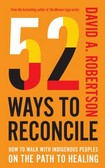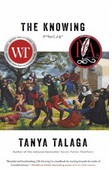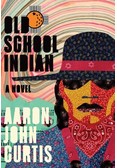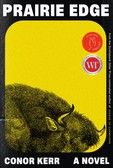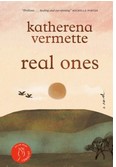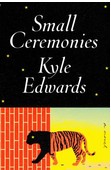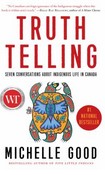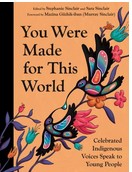We highlight powerful new books that shed light on Indigenous voices, histories, and contemporary experiences.
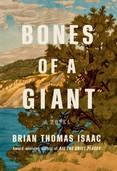
Bones of a giant : a novel by Brian Thomas Isaac
Summer, 1968. For the first time since his big brother, Eddie, disappeared two years earlier--either a runaway or dead by his own hand--sixteen-year-old Lewis Toma has shaken off some of his grief. His mother, Grace, and her friend Isabel have gone south to the United States to pack fruit to earn the cash Grace needs to put a bathroom and running water into the three-room shack they share on the reserve, leaving Lewis to spend the summer with his cousins, his Uncle Ned and his Aunt Jean in the new house they've built on their farm along the Salmon River.
52 ways to reconcile: how to walk with Indigenous peoples on the path to healing by David Robertson
52 Ways to Reconcile is an accessible, friendly guide for non-Indigenous people eager to learn, or Indigenous people eager to do more in our collective effort towards reconciliation, as people, and as a country. As much as non-Indigenous people want to walk the path of reconciliation, they often aren’t quite sure what to do, and they’re afraid of making mistakes. This book is the answer and the long overdue guide.
The knowing: how the oppression of Indigenous peoples continues to echo today by Tanya Talaga
For generations, Indigenous People have known that their family members disappeared, many of them after being sent to residential schools through a coordinated system designed to destroy who the First Nations, Métis and Inuit people are. Anishinaabe author Tanya Talaga retells the history through an Indigenous lens, beginning with the life of her great-great grandmother Annie Carpenter and her family as they experienced decades of government- and Church-sanctioned enfranchisement and genocide.
Old school Indian by Aaron John Curtis
Abe Jacobs is Kanien’kehá:ka from Ahkwesáhsne—or, as white people say, a Mohawk Indian from the Saint Regis Tribe. At eighteen, Abe left the reservation where he was raised and never looked back. Now forty-three, Abe is suffering from a rare disease—one his doctors in Miami believe will kill him. Running from his diagnosis and a failing marriage, Abe returns to the Rez, where he’s persuaded to undergo a healing at the hands of his Great Uncle Budge. But Abe’s time off the Rez has made him a thorough skeptic. To heal, Abe will undertake a revelatory journey, confronting the parts of himself he’s hidden ever since he left home and learning to cultivate hope, even at his darkest hour.
Prairie Edge by Conor Kerr
One night, Métis cousins Ezzy and Grey hatch a plan to capture a herd of bison from a nearby national park and release the animals in downtown Edmonton. They want to be seen, to be heard, and to disrupt the settler routines of the city, yet they have no idea what awaits them or what the fateful consequences of their actions will be. Balancing wit and sorrow with satire, social commentary, and whip-smart storytelling, Prairie Edge explores the radical possibility that a couple of inspired miscreants might actually have the power to make a difference.
Real ones by Katherena Vermette
Lyn has her pottery artwork and her bubbly kid, Willow, to keep her mind, heart, and hands busy. Her sister June, a Métis Studies professor, uproots from Vancouver to move back to Winnipeg, close to family. But then their estranged and very white mother, Renee, is called out as a “pretendian.” As the sisters are pulled into the painful tangle of lies their mother has told and the hurt she has caused, searing memories from their unresolved childhood trauma come rippling to the surface. A heartbreaking and ultimately hopeful story that runs parallel with the long-fought, hard-won battles of Métis people to regain ownership of their identity and the right to say who is and isn't Métis.
Small ceremonies by Kyle Edwards
This may be the Tigers’ last season, and Indigenous student Tommy sees the uncertainty of life in the team’s loss; Clinton is trying to avoid gang violence; Floyd is talented yet insecure about being multiracial; and the adults in Tommy’s life - his mother; Pete, the Zamboni driver; and elders Maggie and Olga - offer well-intentioned but often misguided support.
Truth telling: seven conversations about Indigenous life in Canada by Michelle Good
Truth Telling is a collection of essays about the contemporary Indigenous experience in Canada. From resistance and reconciliation to the resurgence and reclamation of Indigenous power, Michelle Good explores the issues through a series of personal essays.
Who we are: four questions for a life and a nation by Murray Sinclair
Judge, senator, and activist. Father, grandfather, and friend. For decades, Senator Murray Sinclair has fearlessly educated Canadians about the painful truths of our history. He was the first Indigenous judge in Manitoba, and only the second Indigenous judge in Canadian history. He was the Chair of the Truth and Reconciliation Commission, and remains one of the foremost voices on Reconciliation. And now, for the first time, he shares his full story—and his full vision for our nation—with readers across Canada and beyond.
You were made for this world : celebrated Indigenous voices speak to young people by Stephanie L. Sinclair and Sara Sinclair
You Were Made for This World brings together celebrated Indigenous voices from across Turtle Island. Including contributions from activist Autumn Peltier, singer/songwriter Tanya Tagaq, hockey player Ethan Bear, Governor General's Award-winning author David A. Robertson, Manitoba premier Wab Kinew, artists Chief Lady Bird and Christi Belcourt, illustrator Mangeshig Pawis-Steckley, and dozens of others, this beautifully collaborative collection urges readers to think about who they are, where they come from and where they're going, with a warm familiarity that will inspire you to see yourself and your community with proud eyes.

